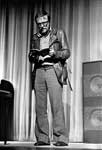Tom Leonard -
Six O'Clock News
To study this angry and confrontational poem, you need to think about:
1. Tom Leonard
Tom Leonard was born in Glasgow in 1944; he is proudly Scottish, and he is working class, and left-wing in his politics. This is a poem which conveys his anger that working class and Scottish people, because of the way they speak, are undervalued and dismissed as ‘second-rate’ by society.
The content of the poem imagines a BBC newsreader explaining that, if he read the news in Glaswegian dialect, people would not believe it. He says there is a right way to speak and spell, and that people who cannot do so clearly don’t know the truth and can’t be trusted. On the surface, therefore, the poem seems be criticising people who talk with a strong regional accent (i.e. this is what WE tend to feel when we meet someone who ‘does not talk proper’). However, although the poem says these bad things about Scottish dialect, it is written in Scottish dialect. The poem is therefore ironic – the message of the poem is exactly the opposite of what the ‘newsreader’ is actually saying.
The feelings of the poet are firstly and mainly anger. He is angry with the ‘toffs’ for dismissing his working class friends as thick, and he is angry with his working class friends for letting them! This is shown in the last line of the poem: ‘Belt up’ – which means ‘shut up’ (which is aggressive), but the word ‘belt’ carries the idea of being hit/punished and makes it very aggressive, even violent.
Leonard also feels class pride. He sees his regional working class dialect as a mark of his working class background, and he does not want to ‘talk posh’, which would be to ‘sell out’ to the establishment. You can see this in the poem when the newsreader says: ‘jist wanna yoo scruff tokn.’ The word ‘just’ is dismissive and shows how Leonard objects to ‘toffs’ calling his regional working class dialect ‘the language of the gutter’, to be ignored or used only for comic effect – his dialect, he believes, is fit for reading the news.
Leonard is sarcastic. He does not really dismiss the Glaswegian dialect as lies. The newsreader in the poem says: ‘this is ma trooth’ – but Leonard does not say so; truth is truth whatever accent you say it in. This shows that despite the humour of the poem, Leonard is angry.
For its structure, the poem is written as a single, unbroken verse, without any punctuation except a few full stops. This is to make it feel like an angry 'rant' (outburst).
The lines are short – including one two-word line: ‘thi trooth’ – to emphasise the key points, and to make the poem aggressive and 'direct'.
The lines are written as they would be on an autocue, which is a visual reference to TV newsreaders, but the fact that they are laid out in a long narrow line may also show that the poet feels that he is being limited and constricted by society because of the way he talks.
In its use of language, the poem is a phonetic version of Tom Leonard's own Glaswegian dialect. It says: ‘Yi widny wahnt’, not ‘you would not want’, and: ‘If a toktaboot’ instead of: ‘if I talked about’. This has the effect of making the poem very aggressive and ‘in your face’ with its message. It also reflects Leonard’s pride in his background and Scottish dialect.
In the poem, the poet does not say anything. All the poem is ‘reported speech’ – it is a BBC newsreader, not the poet, who is speaking. Leonard writes: ‘this is thi six a clock news thi man said. The effect of this is to put the emphasis, NOT on what Leonard the poet feels, but on the unacceptable prejudices that the stuck up BBC newsreader feels. This means that the reader can share Leonard’s outrage at the ‘stuck up’ attitude of a person who looks down on those who don’t ‘talk proper’.
Leonard uses slang and 'uncouth' words – ‘scruff’/ ‘widny’/ ‘thirza’/ ‘cawz’; the effect of this is to make the poem feel ‘rough’ and ‘common’. The word: ‘scruff’ is especially negative, and emphasises the poet’s claim that we ‘write off’ people with a dialect as ignorant.
The poem speaks directly to (even insults) the readers. ‘Belt up’, it finishes. The poem means to be aggressive with its message. This is how the poet challenges our prejudices, and gets across his underlying message that we are wrong to write off people because of their accent.
My feeling when I read this poem is firstly to be proud of my north-east accent. But I think that the difficulty of understanding this poem disproves Leonard’s point – I think that the news should be read in neutral ‘received pronunciation’ so that everybody can understand it equally.
Links
Text of the poem with specialist terms explained - and you can LISTEN to Leonard reading his poem!
Revision Notes - inc. the poem, a notes-grid and the essay.
